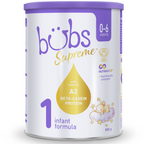Why is my Newborn’s Skin Peeling?
Bringing a newborn into the world is a momentous occasion filled with joy and excitement. However, as parents, we may notice certain changes in our baby's appearance, particularly their skin, which is very common.
Is it normal for newborn skin to peel?
Yes, it is normal to see peeling dry skin on a newborn during the first few weeks of life. This skin-peeling process is a natural part of the transition from the protective environment of the womb to the outside world. It is more commonly observed in babies born past their due date, as their skin has had more time to develop and accumulate dead skin cells. Also, babies tend to have thinner and more delicate skin, making them more susceptible to moisture loss and skin dryness, resulting in newborn skin flaking.
What are the causes of newborn skin peeling?
Newborns are born with a unique protective layer known as vernix, which covers their skin during their time in the womb. As they adjust to the changes in their environment and surroundings, this layer gradually begins to peel off, revealing fresh and healthy skin underneath. Exposure to new elements, such as air and temperature fluctuations, can further contribute to a newborn’s skin peeling.
How long does newborn skin peeling last?
Newborn skin flaking typically persists for the first couple of weeks after birth. During this period, you may observe peeling on various parts of your baby's body, including the hands, feet, and ankles. It is crucial to understand that newborns undergo numerous physical changes during the first few weeks of life, including changes in hair colour, complexion, and skin texture. However, if you have any concerns or notice excessive or prolonged skin peeling, consult a healthcare professional for guidance and reassurance.
How to manage and treat newborn skin peeling?
Although newborn skin flaking generally resolves itself naturally, there are several measures you can take to manage and treat it effectively:
- Reduce bath time. Excessive bathing can strip away the natural oils present on your baby's skin, leading to dry skin on your newborn and subsequent peeling. To prevent this, limit bath time to just a few minutes and use lukewarm water instead of hot water.
- Maintain hydration. Ensuring your baby remains adequately hydrated is essential in combating skin dryness. Offer frequent breastfeeding or formula feeding sessions to keep their skin moisturised from within.
- Protect from external elements. Shield your newborn from direct exposure to sunlight and cold air outdoors, as they can exacerbate dryness and cause skin peeling. Dress your baby in lightweight, breathable clothing and use a hat and sunscreen when necessary.
- Utilise a humidifier. Placing a humidifier in your baby's bedroom can help counteract the drying effects of central heating or air conditioning, thereby maintaining the moisture levels in their skin and reducing newborn skin peeling.
Newborn skincare routine tips:
Establishing a gentle and consistent newborn skincare routine can significantly contribute to managing their skin peeling. Consider implementing the following tips:
- Avoid scented products with harsh ingredients. Fragrances and certain chemicals in scented products can irritate your baby's delicate skin. Opt for fragrance-free hypoallergenic products specifically formulated for newborns.
- Apply a gentle moisturising lotion. After bathing your baby, pat their skin dry with a soft towel and apply a mild, baby-friendly moisturising lotion. This will help lock in moisture and alleviate dryness.
- Use a soft cloth or sponge. When cleaning your baby's skin, choose a soft cloth or sponge to prevent further irritation. Gently pat their skin instead of vigorously rubbing.
- Dress your baby in loose-fitting clothing. Loose-fitting clothing made from natural fibres such as cotton allows for better airflow and minimises friction, reducing the chances of skin irritation.
Newborn skin peeling is a normal occurrence that typically resolves within the first few weeks of life. Implementing simple yet effective management techniques and incorporating a gentle newborn skincare routine can alleviate dryness and promote healthy skin for your precious little one. However, if you have any concerns or if the peeling persists or worsens, it is imperative to seek advice from a healthcare professional. They will provide personalised guidance based on your baby's unique needs and help you find the most suitable solution for their peeling skin.
For more newborn tips and tricks, discover our newborn checklist to make sure you’ve got all your bases covered.


